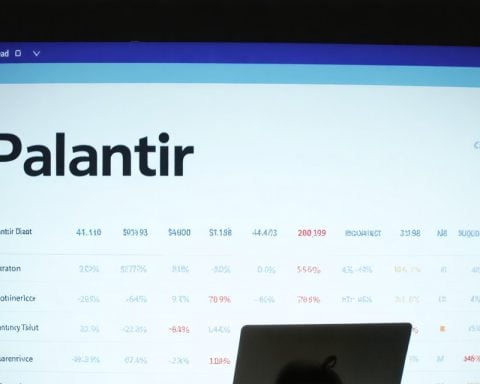- Palantir Technologies’ stock dropped over 5% following unsettling news from the Pentagon and internal company moves.
- The U.S. Defense Department plans to reduce its budget by 8% annually for the next five years, posing challenges for Palantir’s defense contracts.
- CEO Alex Karp initiated a Rule 10b5-1 plan to sell up to 9.98 million shares, potentially generating $1.23 billion, causing unease among investors.
- Despite stock volatility, Palantir reports strong earnings and revenues, though high valuation remains under scrutiny.
- The situation highlights the importance of vigilance amid government budget decisions and strategic corporate actions.
Palantir Technologies, the titan of data analytics, found itself in turbulent waters this week. Investors watched as the company’s stock took a steep dive, dropping over 5% in the wake of unsettling news from the Pentagon and bold moves from within the company. The Pentagon’s whispers of budget slashes fueled unease, clouding Palantir’s future prospects in defense contracts.
The financial storm gathered strength when reports emerged suggesting that the U.S. Defense Department plans to chop its budget by 8% annually over the next five years, sharpening a falcon’s gaze on every dollar. For Palantir, heavily nested in defense projects, such shifts could mean scaling down its ambitions. The Defense Department’s staggering $850 billion budget currently plays a critical role in the company’s growth trajectory.
In a parallel development, CEO Alex Karp, a figure as enigmatic as the data his company unravels, unveiled a strategic shift in stock trading. He adopted a new Rule 10b5-1 plan, clearing the path to selling up to 9.98 million shares. This move, poised to generate a staggering $1.23 billion, rattled investors uneasy about insider confidence.
Despite the headwinds, Karp remains steadfast, defending maverick appointments within the government. As shares wobble, the call for “Palanteers” to rally resounds through Wall Street’s echoing halls, a testament to the company’s passionate following.
Through the storm, Palantir remains a beacon in the data arena, reporting robust earnings and revenues. Yet, with a sky-high price-to-earnings ratio, the market’s scrutiny intensifies. The takeaway? In a world of whispers and bold maneuvers, vigilance is key. Today’s stock volatility underscores the delicate dance between government decisions and corporate strategy.
The Hidden Secrets of Palantir: Navigating Market Turbulence and Future Prospects
How-To Steps & Life Hacks
Understanding Investment Volatility:
1. Research Thoroughly: Before investing in companies like Palantir, understand their primary revenue streams. In this case, a significant portion from defense contracts.
2. Diversify Portfolio: Spread investments across various sectors to mitigate the impact of sector-specific downturns.
3. Stay Informed: Keep abreast of government policy changes affecting defense budgets as they can drastically impact companies like Palantir.
Real-World Use Cases
Applications of Palantir’s Technology:
– National Security: Palantir is used by governments to manage large datasets for intelligence and counter-terrorism operations.
– Healthcare: It aids in monitoring health data and improving patient care outcomes through predictive analytics.
– Financial Services: By analyzing transaction data, Palantir helps in detecting fraud and ensuring compliance.
Market Forecasts & Industry Trends
Defense Budget Cuts Impact:
The anticipated 8% annual decrease in the U.S. defense budget signals potential shifts in procurement, focusing on next-gen technologies and cost-efficiency. Companies in defense analytics and AI like Palantir might need to innovate rapidly to align with changing priorities.
Controversies & Limitations
Insider Trading Concerns:
The introduction of Alex Karp’s Rule 10b5-1 plan, allowing the sale of up to 9.98 million shares, raises questions about management’s confidence in the company’s future growth. Investors should be cautious of the implications this has on perceived insider confidence.
Features, Specs & Pricing
Palantir’s Offerings:
– Foundry: Known for enterprise data integration and analytics.
– Gotham: Proprietary software used for counter-terrorism analytics.
– Pricing: Often tailored to the client’s size and specific needs, making transparency in pricing less common.
Security & Sustainability
Data Security Measures:
Palantir ensures robust data protection protocols. Given its use in sensitive areas such as defense, it’s critical for users to understand how the company handles and secures data.
Insights & Predictions
Future Outlook:
– Adoption of AI: As AI further embeds itself into data analytics, companies like Palantir are expected to pivot more toward artificial intelligence-enhanced solutions.
– Expansion in Other Sectors: With potential contraction in defense revenue, Palantir may look to deepen its footprint in commercial sectors such as healthcare and finance.
Pros & Cons Overview
Pros:
– Leader in data integration and analytics.
– Strong government partnerships and contracts, though at risk.
Cons:
– High dependency on defense contracts.
– Stock subject to high volatility and insider confidence concerns.
Actionable Recommendations
1. Monitor Defense Policy Changes: Investors should track legislation and budget announcements related to defense spending.
2. Evaluate Palantir’s Sector Expansion: Watch other sectors where Palantir increases its presence to assess long-term viability.
3. Analyze Leadership Moves: Consider the outcomes of insider trading plans and evaluate how such strategic shifts align with future growth expectations.
For more insights on investments and market trends, Bloomberg provides comprehensive coverage.
By staying vigilant and diversifying investments, readers can better navigate the intricate landscape of high-risk stocks like Palantir.



















